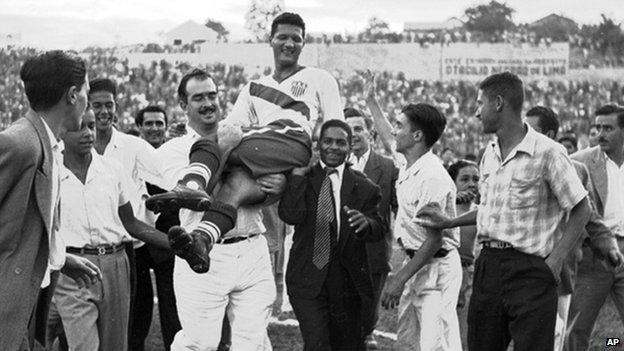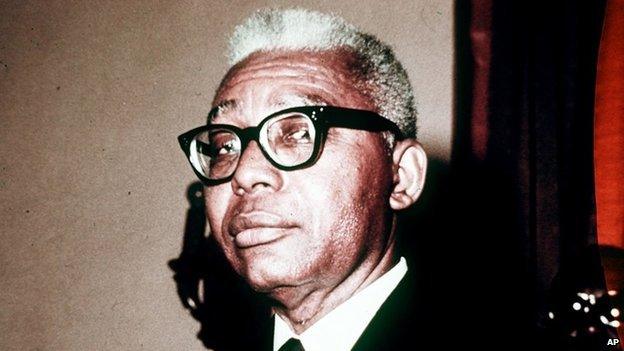Joe Gaetjens - the footballer who disappeared
- Published

One of the biggest shocks in World Cup history happened in 1950, when the US beat England, thanks to a goal scored by Haitian Joe Gaetjens. After Gaetjens returned to Haiti a hero, he later disappeared and was killed, possibly by the president himself.
Joe Gaetjens made his name on 29 June 1950. "Out of nowhere apparently, my father came and went head first and hit the ball hard enough to change its direction - so the goalie from the England team was going one way and the ball went the other way," says his eldest son Lesly.
The 15,000 football fans in Brazil's Belo Horizonte stadium went wild - moments earlier they thought the US didn't have even the slightest chance of beating England. Even the US coach had described his side as sheep ready to be slaughtered.
While the England players were professionals, the Americans were part-timers - one was a teacher, another drove a hearse for a living and Gaetjens was an accountancy student.
.jpg)
He was born in the Haitian capital, Port-au-Prince, in 1924 to a relatively well-off family. He loved football and by the age of 14 was signed up to the Etoile Haitienne team where he became known for his goal-scoring headers.
But his parents felt he couldn't rely on a football career to make a living, so in 1947 they sent him to New York's Columbia University.
While he was there, he took a job washing dishes in a restaurant - partly for the money but mostly because the owner also owned the Brookhattan soccer team. Gaetjens was their star striker and he soon came to the attention of the US national coaches.
"During those days, as long as you were willing to sign a paper saying that you will become a citizen of the United States then you will be included on the team," says Lesly.
Gaetjens was included in the World Cup line-up and was sent to Brazil where the US team faced England.
When one of his team-mates took a shot at the goal, Gaetjens was ready to finish it off. There's no footage of the winning goal - most of the cameras were at the other end of the pitch where they expected the action to take place.
Back home, his family didn't even know he was in the team until they heard he had scored on the radio. The glory didn't last though - the US lost their next game and were eliminated.
In the end, Gaetjens decided not to take US citizenship and pursued his football career in France where he spent two relatively unsuccessful seasons. By 1954 he had returned home to Haiti.
.png)
Joe Gaetjens (centre) with friends in New York
"In Haiti everybody was happy and partying - apparently all the players from all the teams gathered at the airport to receive him - it was like a national holiday kind of thing," says Lesly.
Injury soon brought Gaetjens' playing career to an end but he became a successful coach, helped young people get involved in soccer and also ran a chain of dry-cleaners. He married Liliane Defay and the couple had three children.
"The thing that I really think a lot about is the fact that he never had money in his pocket because he gave it all away to people that were in need... he loved his family and he really wanted to help Haiti," says Lesly.
"I remember seeing him play and I remember kicking a soccer ball with him before the games... I remember planting trees - he loved planting all kinds of fruit trees at the house."
But these were politically troubled times. In 1957, Francois "Papa Doc" Duvalier was elected president. He set about consolidating power by force, establishing his own personal militia to target rivals - the Tontons Macoutes took their name from the Haitian slang for bogeymen.
It's estimated that around 30,000 people were killed during Duvalier's 14-year rule as he brutally stamped out opposition. In 1964, against a backdrop of fear and paranoia, Duvalier declared himself president for life.
Gaetjens was not politically active but others in his family were agitating for change. Two of his brothers, Jean and Freddie had gone to neighbouring Dominican Republic where they were involved in a scheme to overthrow Duvalier.

Francois Duvalier, 1969
Their plans were never realised but the Gaetjens name was brought to Duvalier's attention. "In those days, Duvalier would go after the whole family and is known to have killed entire families of people that went against him," says Lesly.
Gaetjens didn't realise the danger he was in until it was too late. On 8 July 1964, when Lesly was seven, "they sent two Tontons Macoutes to one of my father's dry cleaning [shops]… when he approached, the Tontons Macoutes got [him] in the back of the car and put a gun to his head. Then he disappeared."
His wife, Liliane did everything she could to find him but people were too scared to help or ask questions. All she managed to find out was that he had been taken to Fort Dimanche, a prison notorious for torture.
She and the children stayed in Haiti, living in fear, until 1966. In January that year, they boarded a plane to Puerto Rico pretending they were going on holiday - in fact they were going into exile to start a new life.
For years they lived in hope that Gaetjens was alive, only receiving official confirmation of his death in 1972 - the year after Duvalier died.
It's not known exactly how or when he was killed but over time the family managed to piece together fragments of information.
"The version that I hear the most is that Duvalier himself went that night to Fort Dimanche… and he himself killed my dad," says Lesly. He adds that he has a CIA document confirming that both men were at the prison that night.
After Duvalier's death in 1971, his son Jean-Claude, known as Baby Doc, took over the presidency and ruled until 1986 when he fled the country amid popular discontent.
Since then Haiti has faced coups, corruption and natural disasters - the 2010 earthquake killed more than 250,000 people. One hundred and fifty thousand are still living in temporary accommodation.
Lesly lives in the US but has visited Haiti and written a book about his father. "I sometimes think that they could even make a movie," he says.
"Not so much about the goal because that was one moment but a movie about all the things that happened before and after... it's still the poorest country in the western hemisphere and people are still in misery."
Lesly Gaetjens spoke to Whistledown Productions for the BBC World Service programme Sporting Witness. Listen via BBC iPlayer Radio from 16:30 GMT or browse the Sporting Witness podcast archive.
Follow @BBCNewsMagazine, external on Twitter and on Facebook, external